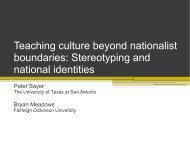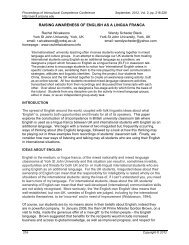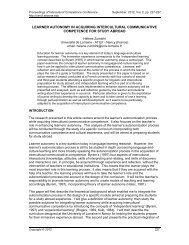BYRAM VERSUS BENNETT: DISCREPANCIES IN THE ... - CERCLL
BYRAM VERSUS BENNETT: DISCREPANCIES IN THE ... - CERCLL
BYRAM VERSUS BENNETT: DISCREPANCIES IN THE ... - CERCLL
Create successful ePaper yourself
Turn your PDF publications into a flip-book with our unique Google optimized e-Paper software.
Paula Garrett-Rucks Byram Versus Bennett<br />
APPENDIX C<br />
Byram’s objectives (as cited in Hoyt, 2012, pp. 104-105)<br />
I. Attitudes (savoir-être): curiosity & openness, readiness to suspend disbelief about<br />
other cultures and belief about one’s own.<br />
Objectives:<br />
a. willingness to seek out or take up opportunities to engage with otherness in a relationship of equality,<br />
distinct from seeking out the exotic or to profit from others.<br />
b. interest in discovering other perspectives on interpretation of familiar and unfamiliar phenomena both in<br />
one’s own and in other cultures and cultural practices.<br />
c. willingness to question the values and presuppositions in cultural practices and products in one’s own<br />
environment.<br />
d. readiness to experience the different stages of adaptation to and interaction with another culture during<br />
a period of residence.<br />
e. Readiness to engage with the conventions and rites of verbal and non-verbal communication and<br />
interaction.<br />
II. Knowledge (savoirs): of social groups and their products and practices in one’s own<br />
and in one’s interlocutor’s country, and of the general processes of societal and<br />
individual interaction.<br />
Objectives (knowledge of/about):<br />
a. historical and contemporary relationships between one’s own and one’s interlocutor’s countries.<br />
b. the means of achieving contact with interlocutors from another country (at a distance or in proximity), of<br />
travel to and from, and the institutions which facilitate contact or help resolve problems.<br />
c. the types of cause and process of misunderstanding between interlocutors of different cultural origins.<br />
d. the national memory of one’s own country and how its events are related to and seen from the<br />
perspective of other countries.<br />
e. the national memory of one’s interlocutor’s country and the perspective on them from one’s own<br />
country.<br />
f. the national definitions of geographical space in one’s own country, and how these are perceived from<br />
the perspective of other countries.<br />
g. the national definitions of geographical space in one’s interlocutor’s country and the perspective on<br />
them from one’s own.<br />
h. the processes and institutions of socialisation in one’s own and in one’s interlocutor’s country.<br />
i. social distinctions and their principal markers, in one’s own country and one’s interlocutor’s.<br />
j. institutions, and perceptions of them, which impinge on daily life within one’s own and in one’s<br />
interlocutor’s country and which conduct and influence relationships between them.<br />
k. the process of social interaction in one’s interlocutor’s country.<br />
III. Skills of interpreting and relating (savoir comprendre): ability to interpret a<br />
document or event from another culture, to explain it and relate it to documents or<br />
events from one’s own.<br />
Objectives (ability to):<br />
a. identify ethnocentric perspectives in a document or event and explain their origins.<br />
b. identify areas of misunderstanding and dysfunction in an interaction and explain them in terms of each<br />
of the cultural systems present.<br />
c. mediate between conflicting interpretations of phenomena.<br />
<strong>CERCLL</strong> ICC Proceedings 33





